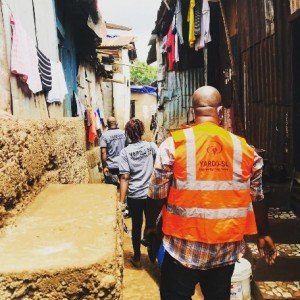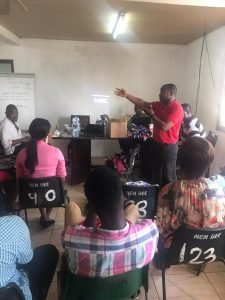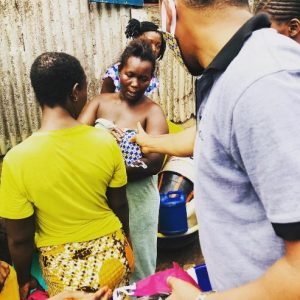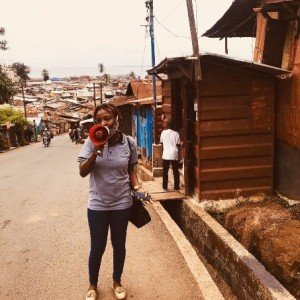By Ahmid C Jalloh, Executive Director. YARDOSL
Introduction:
COVID-19 has disrupted millions of people’s livelihoods, with greater disproportionate impact on poor households and most particularly on young people. This is an opportunity to take bolder steps to contain this health crisis and secure proper access to livelihood especially to the most vulnerable populations.
To achieve this, our response to COVID-19 is strengthened and youth’s rights are not been left out. These rights include right to access to accurate information and knowledge about preventive measures of the pandemic, and access to preventive resources such as veronica buckets, soaps and facemasks. As a youth empowerment agency, young people are at the core of our work. That’s why during this trying time, we have developed this project to give educational support about COVID-19 as well as provide support for handwashing and face-masking to those who cannot afford it.
Problem Statement/Need Assessment:
Statistics from our baseline study shows that youths living in marginalized communities are the most vulnerable in times of the health crisis. In a random nationwide survey, only 1 out of the 10 communities studied have a proper washing system at the time and of the 200 young people interviewed, only 10 have facemasks.
Despite Government’s effort in instituting laws to enforce handwashing and use of facemasks, most people (especially young people in marginalized communities) don’t adhere to the public health protocols at all. This is mostly as a result of two things: most lack the economic power in acquiring the facemasks and handwash system in an already struggling economy, and the other is, people’s perception of COVID-19 and use of facemasks in the first place. This has a direct impact on the reported increasing number of new infected cases across the country.
To help address the problems highlighted above, YARDOSL through 80 volunteers have developed a grassroot youth-led COVID-19 response project called End COVID-19 in Sierra Leone Project on April 2nd, 2020. The organization has used its youthful and dedicated membership of local young leaders to raise awareness on COVID-19 and change people’s perception about the virus through house-to-house campaigns, radio discussion programs, social media engagements etc.
Also, the organization has already donated locally made reusable facemasks to 500 deprived youths and 200 locally made handwash systems to selected marginalized communities across the country. The campaign has targeted slum communities where public health is most at risk, educating and sensitizing young people about COVID-19 and its preventive measures. The campaign has also targeted market places, bike rider’s parks and Attaya bases where young people can be easily found.
What makes the campaign even better more impactful is the incorporation of sensitization against the recent surge in violence across the country, calling on all young people to deviate from violence of any sort, to allow us as a Nation to quickly overcome COVID-19. We have also been able to raise awareness on gender-based violence by educating young women to always report to 116 even during lockdowns.
Challenges:
Despite our continued efforts in helping end COVID-19 in Sierra Leone through increasing public awareness and change of perceptions, and donation of preventive resources such as facemasks and locally made handwash systems, we are encountering numerous challenges. YARDOSL has had its challenge in training, coordinating and keeping the 80 volunteers working on motivation, but nonetheless the organization has been able to let the young leaders understand and appreciate the importance of their involvement in the fight against COVID-19.
Through donations from well-wishers, the organization has also been able to donate the facemasks and handwash systems targeting underserved communities. However, the extra effort and uncertainty in raising these funds have had a negative impact on the project by derailing its activity plan on most occasions.
The Way Forward:
The project is an ongoing project until Sierra Leone is declared COVID-19 free by WHO. However, to make the activity plan easier, the project is classed as phase 1 (starts in April and ends in December 2020). By the end of 2020, the project will be directly implemented in 250 selected communities across all regions in Sierra Leone with an estimated number of 2,500 households covered and over 15,000 people served.
Radio discussion programmes and Social Media engagements is set to reach out to over 20,000 people. The beneficiaries shall be classed as all Sierra Leoneans benefiting from the project donations or sensitizations in one way or the other, especially young people in underserved communities. The project is looking forward to donate 15,000 locally made reusable facemasks and 500 handwash systems.
Any Thing Else:
First of all, we want Government and development partners to acknowledge youth leadership and participation in the fight against COVID-19 in Sierra Leone. This is because: ‘’Young people have the know-how, passion and energy needed to create positive change in their communities. In the COVID-19 fight, youths must be considered as partners so they can assist in the mobilization and engagement of other young people. They can be very instrumental in pushing for attitude and perception change through the peer-to-peer learning process.’’








